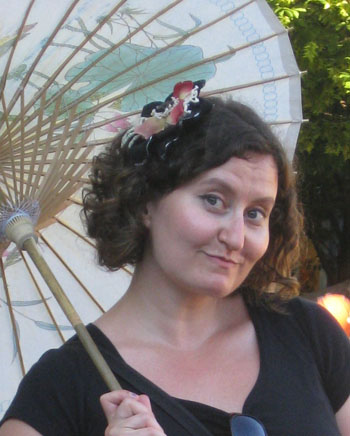You are here
September 2013 - Lana Gelman
 Wholeheartedly committed to learning Spanish, Lana is a student who sets the bar high for her goals and whose unfailingly positive attitude is truly an inspiration. A speech-language pathologist helping elementary school children to overcome speech impediments and communication barriers, she’s already fluent in Russian and English and is driven to master the Spanish language by her desire to connect with and best serve her Spanish-speaking students and their families. In her time at Tierra, her notable dedication to studying Spanish outside of class has facilitated her impressive progress. In her genuine desire to use Spanish to build bridges between English speaking and Spanish speaking communities, Lana embodies the spirit of our mission at Tierra. We wish Lana and all educators and youngsters a wonderful start to the new school year!
Wholeheartedly committed to learning Spanish, Lana is a student who sets the bar high for her goals and whose unfailingly positive attitude is truly an inspiration. A speech-language pathologist helping elementary school children to overcome speech impediments and communication barriers, she’s already fluent in Russian and English and is driven to master the Spanish language by her desire to connect with and best serve her Spanish-speaking students and their families. In her time at Tierra, her notable dedication to studying Spanish outside of class has facilitated her impressive progress. In her genuine desire to use Spanish to build bridges between English speaking and Spanish speaking communities, Lana embodies the spirit of our mission at Tierra. We wish Lana and all educators and youngsters a wonderful start to the new school year!
Name: Svetlana Gelman (prefer Lana)
Occupation: Speech-Language Pathologist
Time Studying at Tierra: About 10 months
1) Why are you studying Spanish?
"I work in an elementary school where the biggest population is Hispanic and second biggest probably Russian. It's a real boon to be able to speak to the Russian families without an interpreter, and I would love to be able to directly communicate with my Spanish-speaking families as well. Also, there are many students in my school who are only beginning to learn English and I would love to be able to connect with them using a language they are comfortable with".
2) What is your favorite part about your experience here at Tierra?
"I love how low-pressure everything is. I feel comfortable trying out new skills. The pace is also great, I feel like I have time to absorb the information and hopefully internalize it. No one likes failing and at Tierra I feel so supported that I am willing to try new things even if I am not very confident in my abilities yet".
3) Can you tell us of a time you have been able to use what you have learned studying here?
"As I work with special education students who often don't have a well-organized functional way to communicate in any language, I am learning to be more empathetic to their plight as I learn to speak Spanish. I am also becoming more aware of just how much repetition is necessary to learn these concepts that seem so basic. I've also learned that some of the mistakes my Spanish-speaking kids make while speaking English are due to the fact that they are directly translating from Spanish, for example, in Spanish, there doesn't appear to be a "watch", only a "clock." And finally, I am happy that I can now do some basic testing without an interpreter and can explain some very basic things to the kids in Spanish. It's also lovely to tell the kids that I am learning Spanish and to let them teach me something, it helps them feel confident and can be a great ice-breaker".
¡Felicidades Lana!
